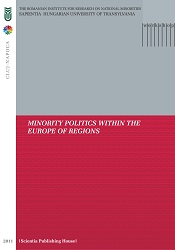Making Sense of Ambiguity: Redefining Minority-Majority Relations in a Post-Soviet Country
Making Sense of Ambiguity: Redefining Minority-Majority Relations in a Post-Soviet Country
Author(s): Mykola Riabchuk
Subject(s): Politics / Political Sciences
Published by: Scientia Kiadó
Keywords: Ukraine; minority-majority relations; Russophone cultural group;
Summary/Abstract: The paper examines highly complex and ambiguous minority-majority relations in the post-Soviet republic of Ukraine. This ambiguity, the paper argues, largely stems from the Soviet tradition of arbitrary ethnic classification based on a formal notion of parents’ ethnicity rather than on people’s ethnic, cultural, and linguistic self-identification. Such a formal approach makes Ukrainians a strong majority in their country and, at the same time, downgrades Russians to the status of one of many ethnic minorities such as Poles, Jews, Crimean Tatars, Hungarians, Romanians, and many others. The formal and arbitrary classification does not only completely distort the ethno-linguistic reality but it also precludes effective implementation of appropriate policies in the field. First, it ignores an obvious fact that a substantial part of Ukrainians are heavily russified and therefore, in many parts of Ukraine, it is not the Russophones but the Ukrainian-speaking Ukrainians who represent a cultural and linguistic minority, which like any other minority, requires state-sponsored support and protectionism for their cultural and linguistic rights. Secondly, by the same token, it ignores that it is Russians and russified Ukrainians who, in many parts of Ukraine, make up a strong majority that barely needs any help – contrary to the socially disadvantaged and culturally marginalised Ukrainian-speaking minority. On the one hand, the Russophone cultural group feels undermined and dissatisfied by the highly arbitrary and ambiguous ‘minority’ status. On the other hand, the status relieves them from any responsibility vis-à-vis real minorities, including Ukrainophones, and strengthens their commitment to a laissez-fair cultural and linguistic policy that benefits them as the strongest players. And thirdly, the laissez-fair policy promoted by the Russian/ Russophone group as a response to the ambiguity and as a way to preserve the de facto dominance is especially harmful for small minorities in Ukraine, who can neither benefit from the symbolical status of a ‘titular nationality’ (like Ukrainians) nor rely on de facto social and cultural dominance like Russians/Russophones. The dissolution of ambiguity, the paper claims, is the only way to craft proper policies for minorities in Ukraine and harmonise tense relations between the two major groups – Ukrainians/Ukrainophones and Russians/Russophones – that do not fit in with the traditional minority/ majority paradigm.
Book: MINORITY POLITICS WITHIN THE EUROPE OF REGIONS
- Page Range: 185-207
- Page Count: 23
- Publication Year: 2011
- Language: English
- Content File-PDF

